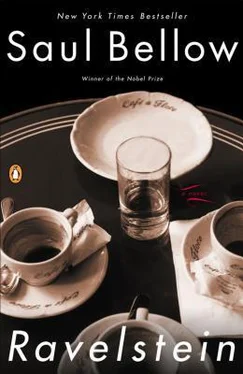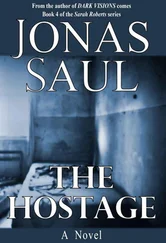The video on mute and Ravelstein himself, silent and perhaps reviewing the facts of disease and death from an unfamiliar angle, followed Nikki out. We led him back to his bedroom with its sleigh-bed and eiderdown silk quilts. When he lay back on the pillows I covered him with all the linens and the silks.
The apartment soon emptied. When latecomers turned up, Nikki pressed the button to hold the elevator door open and said, "Abe would have been so happy to see you but he's on all kinds of drugs and doesn't know whether he's coming or going."
Next day, when Ravelstein brought up the subject I said, "Nikki was very tactful. He wouldn't answer any questions. But the party folded pretty quickly."
"He never answers questions, does he. There are silent questions in every corner but he doesn't acknowledge them. That takes a certain amount of strength."
"He switched off the new video. I don't think I'd know how to do that."
During Ravelstein's last days at home I often kept him company in the morning. Because I lived in the same block and followed no regular schedule I would come by after breakfast. Nikki, whose usual bedtime was 4 a.m. would be fast asleep until 10, whereas Ravelstein dozed because he had no company and lay with his large knees asprawl. The doctors drugged (tranquilized) him, but this didn't stop him from thinking-considering various problems in their dawn-aspect. And even when he was dozing you could learn a lot about him by watching his peculiar Jewish face. You couldn't imagine an odder container for his odd intellect. Somehow his singular, total, almost geological baldness implied that there was nothing hidden about him. He would say-as usual preferring to say it in French-that he had had a _succиs fou__, but now he was facing the cemetery.
Though I was his senior by some years he saw himself as my teacher. Well, that was his trade-he was an educator. He never presented himself as a philosopher-professors of philosophy were not philosophers. He had had a philosophical training and had learned how a philosophical life should be lived. That was what philosophy was about, and this was why one read Plato. If he had to choose between Athens and Jerusalem, among us the two main sources of higher life, he chose Athens, while full of respect for Jerusalem. But in his last days it was the Jews he wanted to talk about, not the Greeks.
When I commented on this change he was annoyed with me. "Why not talk about them?" he said. "In the South they still talk about the War Between the States much more than a century ago but in our own time millions were destroyed, most of them no different from you. From us. We mustn't turn our backs on them.
Moses communicated with God, who gave him instructions, and the connection has lasted for millennia."
Ravelstein went on for quite a while in this way. He said that the Jews had been used to give the entire species a measure of human viciousness. "You tell people that a new great era will begin if you abolish the ruling class or the bourgeoisie, if you rationalize the means of production, if you use euthanasia on the incurables. To minds so prepared you then propose that the Jews be destroyed. And they make a substantial start. They kill more than half of the European Jews-and you and I, Chick, belong to the remainder." These are not Ravelstein's actual words. I am paraphrasing. What he said was that we, as Jews, now knew what was possible.
"There's no telling which corner it will come from next-the French corner? No, no, not France. They had their glut of blood in the eighteenth century and they wouldn't mind if it happened, but they wouldn't be the ones to do it. But what about the Russians? The Protocols of the Elders of Zion were a Russian forgery. And not long ago you were telling me about Kipling."
"Yes, it was Kipling. A wonderful writer," I said. "But somebody put me on to a collection of his letters, and in one of them he was having an angry fit against Einstein. This was early in the century. He said that the Jews had already distorted social reality for their Jewish purposes. But not satisfied with that, Einstein was disfiguring physical reality with his relativity theory, and the Jews were try ing to give a falsifying Jewish twist to the physical universe."
"You'll have to drop Kipling from your list of favorites, then," said Ravelstein.
"No, we can't afford to set up a Jewish Index. For one thing we could never impose it, not even on Jewish readers. Who could ever expect you to drop Celine? By the way, I lent you my copy of his pamphlet '_Les Beaux Draps__'…"
"I never got around to it."
"You have a weakness for the nihilists," I said.
"I suppose it's because they don't tell a lot of high-minded lies. I like the kind who accept nihilism as a condition and live in that condition. It's the intellectual nihilists I can't stand. I prefer the sort who live with their evils, frankly. The natural nihilists."
"Celine recommended that the Jews be exterminated like bacteria. It's the doctor in him, I suppose. In his novels the influence of art is a restraint on him, but in his propaganda he's a killer out and out."
Here this conversation temporarily ended, for once again the quiet ambulance pulled up at Ravelstein's door and the attendants, familiar with the layout, rang the bell of the freight elevator. Ravel-stein had been in and out of the hospital so often that he had arranged with himself to take no notice of it.
Dr. Schley had never discussed Ravelstein's illness with me. He was one of your super-earnest physicians-small, stiff, aquiline, efficient. Such hair as he had left was combed upward stiffly, Iroquois style. He owed me no medical explanations. I was not related to Ravelstein by blood. But by now Schley had seen that Ravelstein and I were very close and he began to pass me silent signals-what a Parisian lady I met decades ago in the ABC music hall taught me to call _chanson а la carpe__. Nobody else seemed ever to have heard this expression but I swore by it-two large fish amid clear bubbles silently communicating by opening their jaws. This was how Dr. Schley notified me that Ravelstein's days were numbered. And Rosamund, too, had said, "This could be Ravelstein's last ride to the hospital." I agreed. And Nikki, naturally, had reached the same conclusion. He put in very long hours, doing errands, taking phone calls. It was Nikki, not the nurses, who shaved Ravelstein with the electric razor while Ravelstein, eyes shut, lolled back his head to lift his chin. A small plastic cup under his nose supplied him with oxygen.
"It doesn't look too good, does it," said Nikki to me in the corridor.
"It doesn't, in fact."
"He has a message for his lawyer. And he told me to send for Morris Herbst."
Well, there was no recovery possible from this disease, as we all knew. When Ravelstein had last been hospitalized he had held impromptu seminars from his hospital bed, presiding brilliantly. The teaching-vaudeville was then still running. Even now his students were sitting in the visitors' lounge under the large skylight-waiting to be sent for-but although he would ask, by name, about one or another of them, he was no longer teaching, or holding court. The fact was that I could already see the early signs of approaching death in his movements-his head becoming a burden to his neck and shoulders, a change in color, especially under the eyes. His opinions were shortened, and there was less concern for your feel ings, so that you were well advised to keep to neutral topics. He said about Vela, "You gave in-you tried to sell me a colored cutout of the woman like the cardboard personalities they used to hang in movie lobbies in the old days. You know, Chick, you sometimes say there's nothing you can't tell me. But you falsified the image of your ex-wife. You'll say that it was done for the sake of marriage but what kind of morality is _that__?"
Читать дальше












